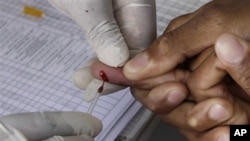An international clinical trial of HIV/AIDS cases shows that when one infected partner gets early drug treatment, the risk of transmitting the disease to the uninfected partner is dramatically reduced.
For every person in sub-Saharan Africa who gets treated for AIDS, health clinics have to turn two infected people away. But now a new study, with participants in 13 cities, could help control the AIDS pandemic and change the way HIV is treated.
Dr. Anthony Fauci is with the National Institutes of Health. "Many studies have been showing that the earlier you start, the better it is for the person who is infected. This study shows that not only is it better for the person who is infected, but it helps that person from transmitting to the person that's their sexual partner, heterosexual partner," he said.
The study looked at almost 2,000, mostly heterosexual couples. Only three percent of the participants were homosexual - so researchers don't know if studies in the gay population would have the same results.
Some of the infected participants started taking antiretroviral drugs right after being diagnosed with HIV. Others started taking them when they began getting sick. The study was supposed to last until 2015, but researchers stopped it because the risk of transmission to the uninfected partners was reduced by 96 percent. "This is a powerful bit of evidence that will go into the thinking and formulation of guidelines and of global policy, policy by WHO, by UN AIDS, by the international organizations that help to provide drugs in the developing world," he said.
Blood tests from all of the participants showed cell counts between 350 to 550 cells per cubic milliliter of blood. That range is a sign of some mild damage to the immune system.
The study is being read with great interest by local health organizations, including the Whitman Walker Health Center in Washington.
Justin Goforth is a nurse and director of Whitman-Walker's Community Health Division. He says many of the division's HIV patients are already given anti-retroviral therapy as soon as they are diagnosed within that range. "Anybody from 350 to 500 T-cells, we're going to work with them to get them ready to work the treatment into their life and to understand that this is a daily commitment for the rest of their life and so on," he said.
Dr. Fauci says the results have universal applications. If newly infected people can be tested and treated before they feel sick enough to see a doctor, Dr. Fauci says people with HIV disease can get help and the medications will prevent them from spreading AIDS.
Dr. Fauci says other proven ways of preventing the spread of AIDS still need to be used: people need to use condoms and microbicides. Men should be circumcised, and people need to practice monogamy.
The challenge is that it is not going to be easy to get to all the people who are infected because the vast majority of people who are infected don't know it. Another challenge could be the cost of running a program that includes wide-spread testing and education, and devoting even more of fragile public health budgets to fighting AIDS.













